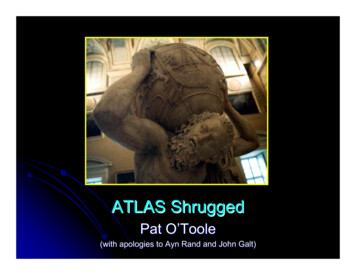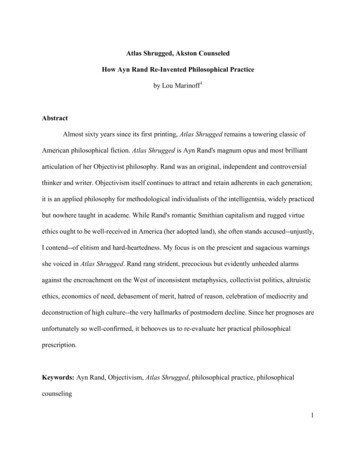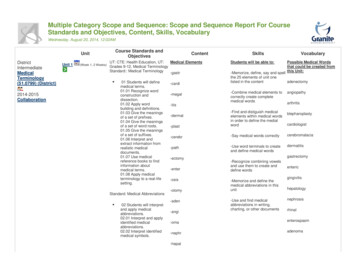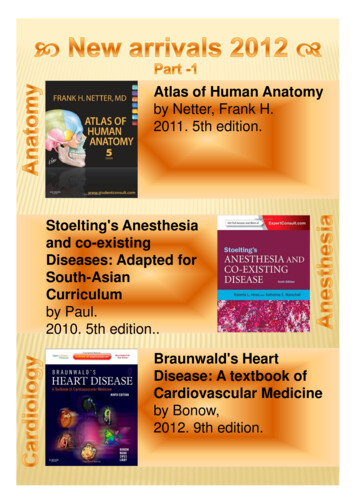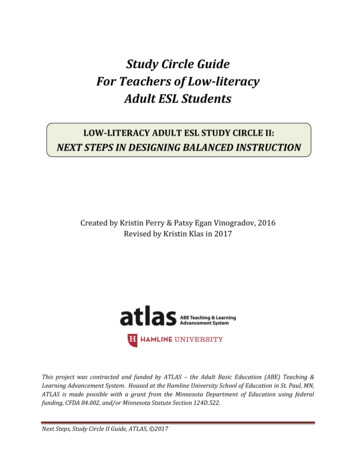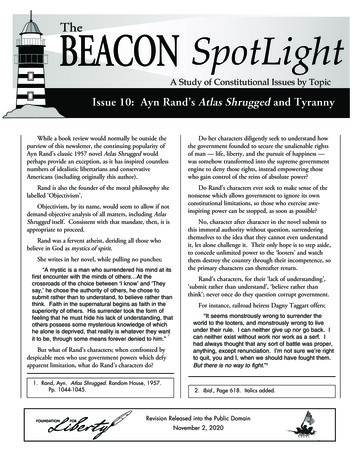
Transcription
SpotLightA Study of Constitutional Issues by TopicIssue 10: Ayn Rand’s Atlas Shrugged and TyrannyWhile a book review would normally be outside thepurview of this newsletter, the continuing popularity ofAyn Rand’s classic 1957 novel Atlas Shrugged wouldperhaps provide an exception, as it has inspired countlessnumbers of idealistic libertarians and conservativeAmericans (including originally this author).Do her characters diligently seek to understand howthe government founded to secure the unalienable rightsof man — life, liberty, and the pursuit of happiness —was somehow transformed into the supreme governmentengine to deny those rights, instead empowering thosewho gain control of the reins of absolute power?Rand is also the founder of the moral philosophy shelabelled ‘Objectivism’.Do Rand’s characters ever seek to make sense of thenonsense which allows government to ignore its ownconstitutional limitations, so those who exercise aweinspiring power can be stopped, as soon as possible?Objectivism, by its name, would seem to allow if notdemand objective analysis of all matters, including AtlasShrugged itself. Consistent with that mandate, then, it isappropriate to proceed.Rand was a fervent atheist, deriding all those whobelieve in God as mystics of spirit.She writes in her novel, while pulling no punches;“A mystic is a man who surrendered his mind at itsfirst encounter with the minds of others At thecrossroads of the choice between ‘I know’ and ‘Theysay,’ he chose the authority of others, he chose tosubmit rather than to understand, to believe rather thanthink. Faith in the supernatural begins as faith in thesuperiority of others. His surrender took the form offeeling that he must hide his lack of understanding, thatothers possess some mysterious knowledge of whichhe alone is deprived, that reality is whatever they want1it to be, through some means forever denied to him.”But what of Rand’s characters; when confronted bydespicable men who use government powers which defyapparent limitation, what do Rand’s characters do?1. Rand, Ayn. Atlas Shrugged. Random House, 1957.Pp. 1044-1045.No, character after character in the novel submit tothis immoral authority without question, surrenderingthemselves to the idea that they cannot even understandit, let alone challenge it. Their only hope is to step aside,to concede unlimited power to the ‘looters’ and watchthem destroy the country through their incompetence, sothe primary characters can thereafter return.Rand’s characters, for their ‘lack of understanding’,‘submit rather than understand’, ‘believe rather thanthink’; never once do they question corrupt government.For instance, railroad heiress Dagny Taggart offers;“It seems monstrously wrong to surrender theworld to the looters, and monstrously wrong to liveunder their rule. I can neither give up nor go back. Ican neither exist without work nor work as a serf. Ihad always thought that any sort of battle was proper,anything, except renunciation. I’m not sure we’re rightto quit, you and I, when we should have fought them.But there is no way to fight.”22. Ibid., Page 618. Italics added.Revision Released into the Public DomainNovember 2, 2020
It would be difficult to understand those words asanything other than unconditional surrender and uttersubmission, conceding defeat to the ‘authority of others’,even when that authority far exceeds our writtenConstitution.And Taggart is far from alone. Philosophy professorHugh Akston informed Taggart why he joined inventorJohn Galt in his quest to remove the men of the mind froma society which sought to absolutely control them;“I quit and joined him and went on strike becauseI could not share my profession with men who claimthat the qualification of an intellectual consists ofdenying the existence of the intellect.”3Judge Narragansett offers;“I quit when the court of appeals reversed myruling I quit—because I could not have borne to hearthe words ‘Your Honor’ addressed to me by an honestman.”4Dr. Hendricks offers;“I quit when medicine was placed under Statecontrol, some years ago.”5Oil magnate Ellis Wyatt said he quit;“because I didn’t wish to serve as the cannibals’meal and to do the cooking, besides.”6Stage Actress Kay Ludlow offered;“Whatever quality of human greatness I have thetalent to portray—that was the quality the outer worldsought to degrade They used my talent—for thedefamation of itself. That is why I quit.”7Tycoon Francisco d’Anconia, in response to“government regulations” passed to cripple his copperbusiness, which “tightened the noose around (his) throat”the “harder (he) worked”, stated that he “saw no way tofight it”, although he offered that John Galt “found theway.”8Galt’s way, in his own words, was simply to go “onstrike.”93. Ibid., Page 741.4. Ibid., Page 742.Galt elaborated later, stating that;“I quit that factory. I quit your world. I made it myjob to warn your victims and give them the method andthe weapons to fight you.”10Galt had much more to say about his strike against thecorrupted world, but never once in the 1168-page noveldoes he ever seek to discover the methods actually used bygovernment officials to exercise essentially unlimitedgovernment power at their whim. He never seeks to learnthe hidden secret of their spectacular success.And Galt offers the following advice;“Do not attempt to rise on the looters’ terms or toclimb the ladder while they’re holding the ropes. Do notallow their hands to touch the only power that keepsthem in power: your living ambition. Go on strike—inthe manner I did. Use your mind and skill in private,extend your knowledge, develop your ability, but do notshare your achievements with others ”11Galt offered insight into the time when he and hisfollowers would return to work, saying;“When the looters’ state collapses, deprived of thebest of its slaves, when it falls to a level of impotentchaos, like the mystic-ridden nations of the Orient, anddissolves into starving robber gangs fighting to rob oneanother—when the advocates of the morality ofsacrifice perish with their final ideal—then and on thatday we will return ”12Galt continued;“The victims are on strike. We are on strike againstmartyrdom—and against the moral code whichdemands it. We are on strike against those whobelieve that one man must exist for the sake of another.We are on strike against the morality of cannibals, be itpracticed in body or in spirit.“We have ceased breaking that moral code. Weshall blast it out of existence forever by the one methodthat it can’t withstand: by obeying it. We are obeyingit. We are complying We have withdrawn the worksof our minds from society.”13Wow, talk about darkness and discouragement,complying with and obeying every effort to enslavemankind. Not exactly the route America’s true founderssought, thank you, God.5. Ibid., Page 744.6. Ibid.10. Ibid., Page 1048.7. Ibid., Page 784.11. Ibid., Pp. 1066-1067.8. Ibid., Page 766. Italics added.12. Ibid., Page 1067.9. Ibid., Page 738.13. Ibid., Page 740.The Beacon SpotLight: Issue 10: Page 2
Really, the best hope for mankind is step aside andobey the looters’ every command, to watch them take overuntil they destroy society because they ran out of victims toplunder? Hardly inspirational.But what is to be expected of atheists who understandnothing of faith and hope, of pursuing a course of actionlarger than themselves?So Rand’s characters, when confronted with invalidgovernment action, action which by any objective measureusing our federal Constitution as the gauge, submit to thatpower without question, surrendering the whole country tothe looters to use at their absolute discretion, allowing themfree reign without resistance until the utter end.Having no belief in God, Rand and her characters hadonly reason. When that reason was insufficient tounderstand the problem actually facing them, they were leftwith nothing but death and destruction.Thus it is perhaps without surprise when scores ofpeople who ride a fume-puffing coal-powered train near theend of the book die of asphyxiation in the eight-mile longTaggart Tunnel or when the Project X Xylophone soundray weapon vaporizes everything within a 100-mile radius atthe hands of a mindless brute who cannot even understandthe operator controls but who wants to rule over the secretfacility anyway.And Rand had more to offer on the coming day whenthe men of the mind could return.Though Francisco d’Anconia offered that he “saw noway to fight” absolute government control, he offered that“John found the way”. And that way was;“to extinguish the lights of the world, and when wewould see the lights of New York go out, we wouldknow that our job was done.”14Wow, what inspiration; what hope — to have the sameend-goal as the real-life terrorists who attacked that city onSeptember 11, 2001.While Rand’s characters had far different motives thanthat of those who unleashed America’s most-destructiveterrorist attack, nevertheless to accept the same end-gamescenario as used by the most rabid of our country’sadversaries hardly seems wise.Rand’s book offers further evidence of hypocrisy,beyond her harsh attack on religious followers of Christ.For instance, Hugh Akston, states;“We never make assertions, Miss Taggart That isthe moral crime peculiar to our enemies. We do nottell—we show. We do not claim—we prove.”15Really, they never make assertions; they do not claim,they prove?Well then, what about when Francisco d’Anconia tellsindustrialist Hank Reardon;“Those pieces of papers, which should have beengold, are a token of honor—your claim upon the energyof men who produce”?16“Should have been gold” is an assertion, one which wasnot proven therein. Never once in the lengthy novel wasany effort ever exerted to understand how the 1933confiscation of gold in the United States was really only amargin call on over-extended bankers who had a legal dutyto back their banknotes with gold, with everyone elseactually free to retain their gold.On the same subject, d’Anconia offers;“Whenever destroyers appear among men, theystart by destroying money, for money is men’sprotection and the base of a moral existence.Destroyers seize gold and leave to its owners acounterfeit pile of paper. This kills all objectivestandards and delivers men into the arbitrary power ofan arbitrary setter of values. Gold was an objectivevalue, an equivalent of wealth produced. Paper is amortgage on wealth that does not exist, backed by agun aimed at those who are expected to produce it.”17Although Rand is certainly correct with her view as togold’s proper status as the legal standard for objective value,never does she or her characters seek to discover how goldwas cleverly seized and replaced with paper money, all legalsleight of hand without true authority.For instance, Dagny Taggart says to John Galt;“‘What’s Mulligan doing with a mint’?”18Rand narrates next that;“Galt reached into his pocket and dropped twosmall coins into the palm of her hand. They wereminiature disks of shining gold, smaller than pennies,the kind that had not been in circulation since the daysof Nat Taggart.”1915. Ibid., Page 735.16. Ibid., Page 410.17. Ibid., Page 413.18. Ibid., Page 727.14. Ibid., Page 766.19. Ibid.The Beacon SpotLight: Issue 10: Page 3
What then of that lack of gold circulation? What didGalt and his followers do in response? ‘Blank out’, as Randwould ascribe of her religious adversaries.As Rand would write against the believers of God,when their own understanding of reality “clashed with theassertions of others, with their arbitrary orders andcontradictory commands,” they would give in “to so cravena fear of independence that he renounced his rationalfaculty.”20Rand’s characters suffered this same ‘blank-out’mentality when confronted with invalid government action,although never does she admit this.For example, one finds within Atlas Shruggedconversations such as that between Taggart and Galt, whereshe asks him “Well, where can I buy the gold?” Galt offers,in complete submission to corrupted government;“You can’t Not where you come from. Your lawsforbid it.”21Oh really, in what way, exactly?Yes, for a forty-year period between 1933 and 1975, itcertainly appeared that way to the un-informed, but whynot work diligently to discover how the governmentinstituted to protect persons and their property could everbe transformed into its opposite, as does the author writingthis newsletter, in his own works?Rand was right to hold gold up as our nation’sStandard of Value, but never once do her characters look todiscover exactly how counterfeit piles of paper ever gainedan improper foothold as legal tender in the country foundedalso upon property and the sanctity of contract.Rand ruthlessly disparaged the religious, but hercharacters commit the same errors she accuses of heropponents.Though Rand went to great length to show why thelooters’ shouldn’t be allowed to exist, never once do theyever question how exactly those looters ever gained suchawe-inspiring power in the first place.Rand offers that mystics’ belief in God makes God’sfollowers mindless automatons who submit withoutquestion to the authority of men who claim authority fromGod.But then Rand’s characters submit without question tothe authority of men who claim authority only throughgovernment, even the government meant to be extremelylimited in its extent.Of the two, which would be the greater folly?And human history is actually replete with countlessnumbers of Christians standing up against the mostimpossible of odds against every sort of tyrant who soughtto deny them their right to worship God, choosing evenmartyrdom over denying their faith, who do not waverfrom their principles even in the face of certain death.So what do Rand’s characters do when confrontedwith harsh and unjust laws? They obey them. Theycomply, while patiently waiting for the destruction ofmodern society.Of the two parties, again which is more principled?Which parties actually stand more firmly upon theirc
Atlas Shrugged. Random House, 1957. Pp. 1044-1045. 2. Ibid., Page 618. Italics added. The Beacon SpotLight: Issue 10: Page 2 It would be difficult to understand those words as anything other than unconditional surrender and utter submission, conceding defeat to the ‘authority of others’, even when that authority far exceeds our written Constitution. And Taggart is far from alone .
